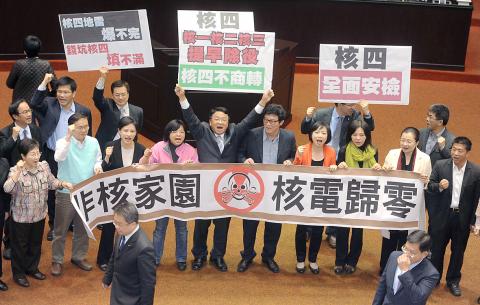|
Plan to condemn MAC
minister fails
STRONG WORDS: The opposition proposed condemning
the MAC minister, saying that the manner he handled ‘issues with China
endangered the nation’s sovereignty’
By Shih Hsiu-chuan / Staff reporter

Legislators from Taiwan
Solidarity Union and the Democratic Progressive Party hold up signs as they
protest against a Cabinet request to grant an additional NT$10.1 billion to
state-owned Taiwan Power Co to continue construction of the Fourth Nuclear Power
Plant.
Photo: Liu Hsin-de, Taipei Times
Taiwan Solidarity Union (TSU) and
Democratic Progressive Party (DPP) lawmakers yesterday failed to force through a
resolution condemning Mainland Affairs Council (MAC) Minister Wang Yu-chi (王郁琦)
over his handling of issues with China that they said have put the nation’s
sovereignty at risk.
In their draft proposal, the opposition parties accused Wang of violating
Article 104 of the Criminal Code, which concerns people collaborating with
foreign states with the intent to subject the nation’s territory to those other
states, because the council has “taken no action to counter China” when it
recently claimed sovereignty over Taiwanese territory in its newly released
passports.
China published its new e-passports in May. The e-passports show a map of China
with Taiwan and the South China Sea included, as well as depictions of Taiwan’s
tourism spots — Nantou County’s Sun Moon Lake (日月潭) and Hualien’s Chingshui
Cliffs (清水斷崖).
The proposal said that “China has seriously encroached upon Taiwan’s territorial
sovereignty by issuing the passports.”
In line with international law, the council’s failure to respond to the new
passports “is no different from tacit acceptance” of China’s claim that it has
sovereignty over Taiwan and the South China Sea, it said.
The opposition parties also said that Wang has been “too soft” on China, taking
as an example the government’s recent decision, in which the council was
involved, to allow the controversial Chinese Music Chart Awards (中國歌曲排行榜) to
hold a concert in Taiwan.
Other examples of the MAC’s “soft” stance toward China wasWang’s defense of
Taiwan Affairs Office deputy director Sun Yafu’s (孫亞夫) rights to freedom of
speech when Sun “blatantly made pro-unification comments” during his recent
visit to Taiwan and that Wang said a visit by Tibetan leader the Dalai Lama
“would cause trouble for the government.”
The TSU and DPP proposed that the legislature condemn Wang in a resolution
because the way he handled issues with China “endangered the nation’s
sovereignty.”
Chinese Nationalist Party (KMT) lawmakers blocked the proposal.
The KMT lawmakers also voted down another proposal which demanded President Ma
Ying-jeou’s (馬英九) administration step forward and join hands with international
organizations in supporting Tibetans in their struggle against “Chinese
oppression.”
Under the proposal, the opposition parties demanded that Ma issue a strong
condemnation of the rules China has imposed on Tibet.
The proposal urged the Mongolian and Tibetan Affairs Commission to review the
many cases of self-immolation of Tibetans and complete a report within one
month.
It proposed inviting both the Dalai Lama and exiled Uighur activist Rebiya
Kadeer to visit Taiwan.
TSU and DPP lawmakers also proposed cutting a request by the Executive Yuan to
grant an additional NT$10.1 billion (US$347.79 million) to the state-owned
Taiwan Power Co to continue construction of the Fourth Nuclear Power Plant.
The proposal demanded that the government not put the power plant into operation
after the construction is completed because of safety concerns.
It was put forward when the budget proposal for state-owned enterprises and
non-profit government funds for this year was deliberated.
The KMT lawmakers voted it down by two votes.
|
![]()
![]()
![]()